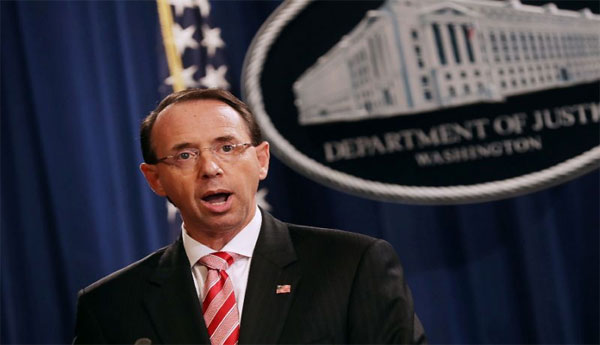The charges brought by special counsel Robert Mueller were revealed just days before President Donald Trump meets with Russian President Vladimir Putin.
WASHINGTON — Twelve Russian intelligence officers have been indicted in connection with the bitcoin-funded hacking of Democratic organizations and the Hillary Clinton campaign “with the intent to interfere” in the 2016 election, officials announced Friday.
The charges, brought by special counsel Robert Mueller and announced by Deputy Attorney General Rod Rosenstein, come at a diplomatically sensitive time — just days before President Donald Trump meets formally for the first time with Russian President Vladimir Putin in Helsinki.
Among the new details: the conspirators allegedly first tried to compromise email accounts used by Clinton’s personal office on July 27, 2016, the same day that Trump appeared to urge Russia to go after her emails at a campaign press conference in Florida.
Prosecutors say that in August 2016, a U.S. congressional candidate requested and received from stolen documents related to an opponent from an online persona created by the Russian cabal. And a state lobbyist received stolen data on Democratic donors later that month, the indictment alleges.
 Rosenstein, who laid out the allegations at a news conference that began while Trump was meeting with Queen Elizabeth in London, said he had briefed Trump earlier in the week and that the president was “fully aware” of the charges in the indictment.
Rosenstein, who laid out the allegations at a news conference that began while Trump was meeting with Queen Elizabeth in London, said he had briefed Trump earlier in the week and that the president was “fully aware” of the charges in the indictment.
A statement from the White House did not address the allegations of Russian government interference and focused only on what was not in the indictment.
“Today’s charges include no allegations of knowing involvement by anyone on the campaign and no allegations that the alleged hacking affected the election result. This is consistent with what we have been saying all along,” the statement said.
The broad strokes of the hacking operation had already been made public, but the indictment provided new details and named names.
The court papers say that the defendants — two of whom were also charged with orchestrating attacks on state election systems — disseminated emails stolen from the Democrats through two online personas that they created, Guccifer 2.0 and DC Leaks.
William Bastone of the Smoking Gun website tweeted later Friday that he was the “U.S. reporter” referred to in the indictment who had received from Guccifer 2.0 the “password access to a nonpublic, password-protected website” that contained emails that had been stolen from “Victim 1.”
The defendants used spear-phishing techniques to steal user names, passwords and emails and paid for the operation with bitcoin and other cryptocurrencies, the indictment alleges.



